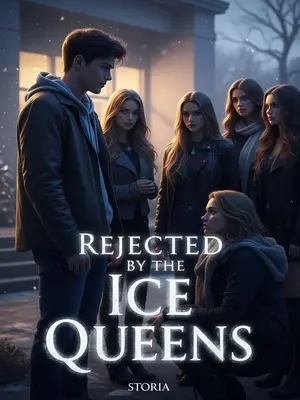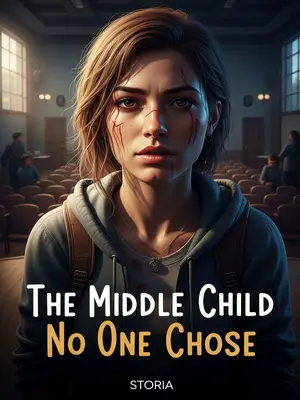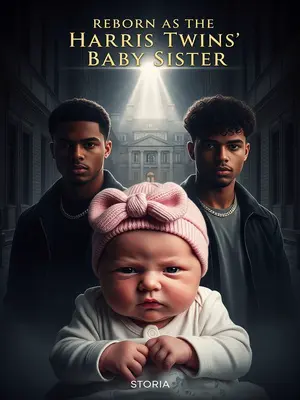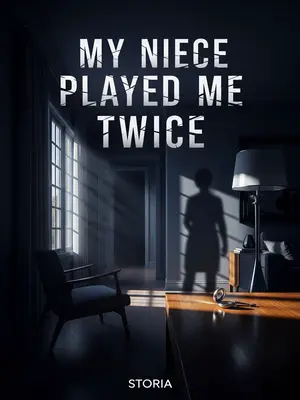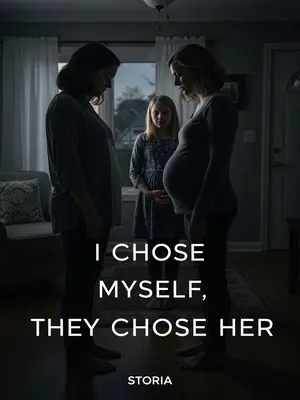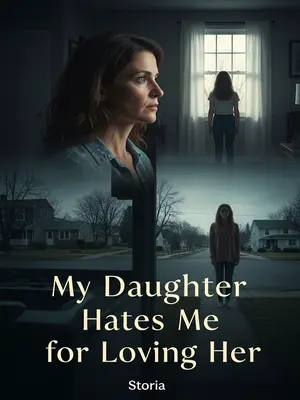Chapter 1: The Blame That Broke Me
The day my real family found me, the girl who'd lived my life walked straight into the ocean. The whole town blamed me.
The shock hadn’t faded. It buzzed through my bones, cold and relentless, as police sirens wailed somewhere down the shoreline, mixing with the crash of the surf. I just stood there, sand grinding into my sneakers, while the sky pressed in, heavy and endless.
Everyone said it was my fault she was gone.
Rumors flared up everywhere—at the gas station, the grocery store, even outside the church. People stared, muttered, crossed the street when they saw me coming. It felt like shame had been sewn right onto my skin, impossible to peel off.
Mom sobbed as if the world had ended.
She sat hunched at the kitchen table, shoulders caving in, her mug of coffee left to go cold by her elbow. Her grief seeped into every corner of the house, thick and choking, like the smell of burnt toast that just wouldn’t leave.
Dad slapped me across the face ten times.
The first blow was so sharp I barely felt it. The rest blurred together—his voice rough, broken with fury and disappointment. I wanted to scream, but my voice was gone. Every hit told me I didn’t belong, and I started to believe it.
My brother kicked me off the third-floor landing, sending me tumbling down to my death.
The world spun as I fell, his words echoing—accusations and anger. There was a flash of pain, then nothing, just a black silence deeper than anything I’d ever known.
When I opened my eyes again, I was back to the day I first came home.
It was like waking up in the middle of a dream you can’t escape from. Sunlight spilled through lace curtains, laying patterns across the wood floor. My hands shook as I reached out, half-expecting it all to vanish.
The room meant for me was wrecked—Aubrey’s dog had destroyed it.
The scent hit me first—a punch of urine and something worse. My eyes stung, and I could taste the sour air on my tongue. Every breath was a reminder I wasn’t wanted here. Torn magazines, shredded shoes, stuffing everywhere. The dog barked under the desk, tail wagging like this was all a joke.
Aubrey cried, tears streaming: “Sorry, sis, you can have my room. I’ll go sleep in the basement or whatever.”
Her voice caught on "sis," and she wiped her nose on her sleeve. For a second, I almost believed she was sorry, but her performance was too perfect.
Mom hugged her, worry etched deep: “You never sleep well. What if you get insomnia from changing rooms?”
She rubbed slow circles on Aubrey’s back, glancing at me like I was the one who didn’t belong. The air was thick with her anxiety, clinging to Aubrey as if she might break.
But this time, I didn’t pick a room.
My heart hammered. The old taste of hurt, metallic and bitter, was still in my mouth. I finally understood it wasn’t a room I needed—it was someone who wanted me.
I picked a person.
Just like before, the room meant for me was trashed.
Little puffs of cotton clung to the bedframe. A chewed-up teddy bear lay half-drowned in the mess. It felt personal—like a sign nailed to the door: You’re not welcome here.
Dog poop and pee soaked the bed and floor.
The stench was brutal, making my eyes water. I pressed my sleeve over my nose, fighting the urge to gag.
My vision blurred—not just from the smell, but from remembering every other place I’d tried and failed to call home.
Aubrey scolded her husky through tears: “Look what you did! How could you wreck her room like this? Bad dog, ugh…”
She tugged the collar, trying to look in control, but her hands shook. The husky just panted, happy and oblivious.
She looked up, face streaked with tears. “Sorry, sis, you can stay in my room for now. I’ll move to the basement…”
Her eyes darted to Mom, hoping for a rescue.
The house had two guest rooms. One was mine—now a disaster. The other was for Grandpa, who’d just arrived from the edge of town.
Grandpa’s old brown duffel sat by the door, years of wear ground into the seams. The faded photos on the wall still showed his proud smile.
As Aubrey packed her things for the basement, she tossed clothes into a basket, shoulders hunched. The basement was all concrete and a flickering bulb—a place you only slept if you had to.
Mom started out annoyed at Aubrey and the dog, but the second Aubrey cried, her anger melted. She hugged Aubrey: “It’s not your fault, honey. You never sleep well—what if you can’t sleep in a new room? You two girls can share tonight, and we’ll get the best cleaners tomorrow.”
She squeezed Aubrey so tight her ponytail came loose. “We’ll call the best cleaning service in town. Don’t worry, sweetheart.”
But Grandpa, quiet in the corner, suddenly snapped: “You can’t even keep a dog under control? Looks to me like you did this on purpose! If you didn’t want Natalie back, why bring her home at all?”
He leaned on his cane, tapping the hardwood. His eyes were sharp, able to cut through any excuse.
Mom frowned. “Dad, that’s not it.”
Her voice was careful, but her jaw tightened. She smoothed Aubrey’s hair with trembling hands.
Grandpa raised his voice. “If it’s not, then what is it? Whole house full of people, and you can’t even watch a dog!”
His words crashed around the room. Dad just stared at his phone, pretending not to hear.
Aubrey’s sobs grew louder, echoing up the stairs. The dog whined, pawing at her ankle.
Mom snapped, “Dad, can you not stir the pot?”
She shot him a look that said ‘enough,’ lips pressed tight, as if holding back years of arguments.
Grandpa wouldn’t back down. “You want two people who barely know each other to cram into one room? That’s your big solution? If you can’t give her a place, I’ll leave right now—and Natalie can come live with me!”
He stabbed the air with his finger. His words hit like a thrown gauntlet.
Mom barked, “You call that place you live a house? You want her to go stay with you too?”
Her cheeks flushed. She started pacing, eyes darting everywhere but at Grandpa or me.
Grandpa’s face darkened. “All these houses you live in? They’re mine! Why am I in a dump now? Because my own son and daughter-in-law are ungrateful, that’s why! You talked me into signing everything over, then kicked me to the curb—”
He gripped the back of a dining chair until his knuckles went white. The old clock ticked in the silence.
Mom, caught between guilt and anger, cut him off: “Fine! Just ask Natalie yourself! See if she wants to go live with you in that old house, or stay here in this big place!”
She crossed her arms, chin high—the same move she used in every family fight. The air was electric.
Last time, fresh from foster care, I was lost in this chaos.
I shrank inside myself, arms wrapped tight, wishing I could disappear. The walls felt unfamiliar, and every breath was heavy with expectation.
I just wanted to be with my parents, to be loved like other kids.
The ache in my chest was sharp. Watching Aubrey in Mom’s arms, I wondered what I was doing wrong. Why wasn’t I the one anyone wanted to comfort?
So, when Mom yelled at me, I said I wanted to stay home.
I nodded, voice barely a whisper, desperate not to be sent away again. Hope fluttered, thin as a candle flame.
I ended up sharing a room with Aubrey.
That night, I lay awake, listening to the floor creak and Aubrey’s soft breathing. Her dog barked once, then fell quiet. I stared at the ceiling, waiting for sleep that never came.
The next day, Aubrey came down with a high fever.
Mom rushed her to the clinic, swaddled in blankets. Dad paced, scowling at me like I’d brought home the plague.
The whole family was in mourning, wondering if Aubrey had caught a chill.
Grandpa called twice. Aunt Rita showed up with soup. Everyone whispered about how fragile Aubrey was—how cruel life could be.
Aubrey, eyes red, mumbled: “Maybe… I don’t know. When I woke up, my blanket was gone…”
She looked at me, eyes watery, as if begging for forgiveness or pointing blame. Her words hung in the air like a curse.
Dad and Mom immediately made me leave Aubrey’s room.
They packed my stuff in a box and moved me to the guest room. I sat on the bed, fists clenched, feeling like a stray dog being kicked out.
My brother slapped me, jaw set: “If I ever catch you picking on Aubrey again, I swear I’ll make you pay!”
His voice was low and threatening. He slammed the door, the echo ringing down the hall.
That was the first time I got hit after coming home.
The sting faded, but the shame stayed.
They all thought I’d taken Aubrey’s blanket on purpose, made her sick.
Whispers chased me through the house, every look heavy with blame. I felt myself shrinking with every glare.
I tried to explain, but no one cared—no one listened.
My voice drowned in their worry for Aubrey. I learned quick: some stories get believed, and some don’t.
So this time, I told Mom: “I’ll go live with Grandpa.”
My words surprised even me, coming out strong and clear. Grandpa’s eyebrows shot up, but he just watched, silent.
In my old memories, Grandpa was always fighting with my parents—never easy to get along with.
I remembered slammed doors, shouted phone calls, the way his face turned red. But he always sent a birthday card, even if it was late.
Now, the foster system wouldn’t take me back. As a high schooler, I needed somewhere to go.
I looked at the empty street outside, realizing this was my crossroads. No one was coming to save me this time.
Mom was stunned.
She blinked, silent. The pause stretched out longer than it should have.
Then she sighed, trying to sound gentle: “Natalie, Aubrey didn’t mean it. The dog was just being naughty…”
Her voice was softer, but the annoyance leaked through, like she was tired of my drama.
She thought I was just acting out, rejecting the good life out of spite.
I said nothing, just stared at her.
She fiddled with her bracelet, not meeting my eyes.
She finally shrugged: “Fine, if you want to go to Grandpa’s, then go. He lives alone—you can keep him company for us.”
She tried to sound casual, but relief flickered in her face. She didn’t have to pretend to make me feel welcome.
I could tell she was relieved.
Her shoulders dropped, and she turned back to Aubrey, who’d stopped crying.
So, she never really wanted me back either.
It hurt, but less than I expected. Maybe I was finally getting used to disappointment.
Too bad, last time I never saw through it.
How many years had I wasted chasing a family that never wanted me?
Back then, I didn’t know my parents only brought me home because the state forced them. They had no choice.
I remembered the caseworker’s tight smile, her insistence I pack my things. My family had never chosen me—they just played along.
Grandpa looked surprised, but didn’t ask why. He just took me with him.
He grabbed my backpack and nodded toward the door, lips pressed in a thin, proud line. No speeches, just action.
Mom made a show of saying: “Your dad and brother are busy today. When they get a chance, we’ll throw you a welcome party.”
She smiled at Grandpa, her voice a little too loud. She glanced at me, then away.
Last time, I believed her and waited.
I pictured balloons, a Safeway cake, maybe a "Welcome Home" sign. I waited, planning what to wear.
But the party never happened.
I stopped checking the calendar after a while. The only parties were for Aubrey.
This time, I just said, flat: “Yeah, we’ll see.”
The kitchen went quiet. Even the dog stopped panting.
Mom looked awkward, clearing her throat and busying herself with her phone.
As we left, Aubrey shot me a smug smile.
She watched from the stairs, one eyebrow raised, lips curled in a secret smirk. She hugged her dog like a trophy.
She must have thought she’d won.
The look in her eyes said it all. The game was rigged and the rules always changing.
But this time, I didn’t care about their love, or about beating her.
The burden I’d carried felt lighter. I walked out the door, the weight of their rejection finally lifting. This time, I was choosing myself.


